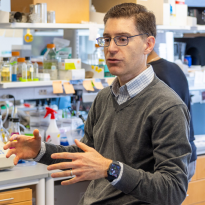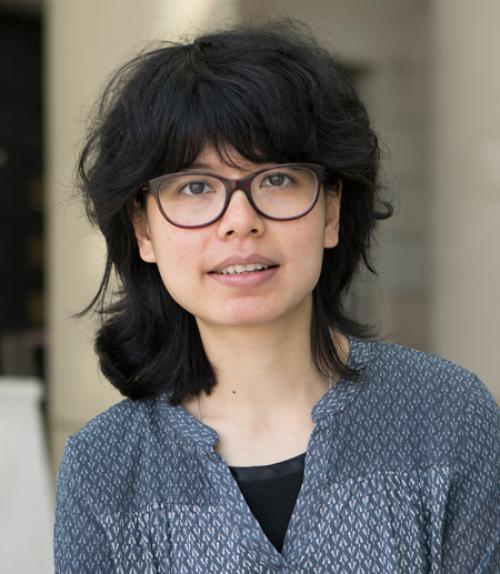One of the goals of personalized medicine is to be able to determine which treatment would work best by sequencing a patient’s genome. New research from the lab of Yimon Aye, assistant professor of chemistry and chemical biology, could help make that approach a reality.
Using her group’s novel chemical procedure dubbed “T-REX,” along with a patent-pending targeting molecule also developed in her lab, Aye and her group have uncovered interesting facets of several well-known cancer-cell mutations that, if present in a patient, could inform treatment options and potentially produce more favorable outcomes.
“People wonder why certain drugs are more efficient in one individual over another,” said Aye, a Milstein Sesquicentennial Fellow in the College of Arts and Sciences who also has a joint appointment in the Department of Biochemistry at Weill Cornell Medicine. “Our discovery gives us a foundation to think about and design inhibitors that will … be much more effective in the patients carrying certain mutations.”
The Aye Lab has published two related papers on this discovery in the last couple of months, both in Cell Chemical Biology. “Privileged Electrophile Sensors: A Resource for Covalent Drug Development” was published online June 22; “β-TrCP1 Is a Vacillatory Regulator of Wnt Signaling” was published online July 20.
The first paper explains how reduction-oxidation, or redox, signaling – which is commonplace inside cells – affects the activity of specific enzymes, and how certain enzymes’ redox-specific processes could be harnessed for targeted drug design.
Research for the second paper started to test that theory. To determine which signals are affecting the response of a particular protein, the group used its T-REX procedure coupled with a widely used strategy to deplete the cell of a specific protein of interest.
One challenge is that multiple variations, or isoforms, of the same protein can all catalyze the same cellular function, “but the nuances of biology rest in how individual isoforms are regulated,” Aye said.
“Some may be important in only certain types of tumors, or certain types of cells, so being able to discriminate one isoform over the other is important,” she said.
The group’s first key finding: The “cross-talk,” or interaction back and forth, between cell signaling pathways is regulated depending on the concentration of a certain transcription factor (Nrf2), a fact that isn’t clear unless you are able to selectively stimulate Nrf2 signaling, a method Aye pioneered.
The second, and perhaps more interesting in terms of disease: A key mutation of cancer cells on the N-terminus – the start of a protein chain, which often contains key signaling information – would make them more susceptible to certain targeted therapeutics than those without the mutation.
“What we’ve discovered as a strategy is a means to target this pathway in the cancer cells that carry selective mutations on this domain [the N terminus],” Aye said. “Potentially, patients can be genotyped to see if they carry these mutations, and they should respond much better to small molecules that activate antioxidant response.”
Aye said understanding the many complexities of oncogenesis and cell signaling is crucial to developing better therapies for cancer and other diseases. “We could design much more selective therapeutics by understanding the underlying cross-talk,” she said.
Marcus J.C. Long, a postdoctoral researcher in the Aye Lab, was lead author on the first paper and co-lead with former postdoc Hong-Yu Lin on the second. Other contributors included current postdoc Yi Zhao, doctoral students Saba Parvez and Jesse Poganik, and undergraduate chemistry and biology major Paul Huang ’18. All are members of the Aye Lab and the Department of Chemistry and Chemical Biology.
This work was supported by grants from the National Science Foundation, the National Institutes of Health, the Sloan Fellowship, the Beckman Foundation and the Office of Naval Research.
This story also appeared in the Cornell Chronicle.





